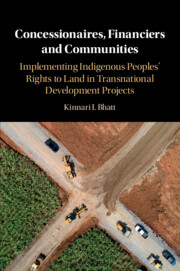 Concessionaires, Financiers and Communities
Concessionaires, Financiers and Communities A Comparative Look at Concessionaires, Indigenous Peoples and Power
Published online by Cambridge University Press: 02 March 2020
This chapter extends examples of the second field of private mechanism: direct mediated agreement-making between concessionaires and indigenous groups. Through transnational examples from plural contexts in Russia, Suriname, Australia and Mongolia, I illustrate how concessionaires can plug and also worsen the lacunas in formal law through agreement-making, with mixed outcomes for indigenous communities. The findings suggest a link between the level of recognition afforded to groups in an underlying formal legal regime and the quality of agreement-making. In some cases, private mechanisms when integrated with the domestic legal framework, might address some of the problems that exist within the contemporary legal framework for development projects in Chapter 3, and provide clearer and fairer outcomes for communities. Other cases reveal negative practices around corporatised arm’s-length methods, behaviours and conditionalities through which integration is conducted. The debates in this chapter signal a new species of specialised commercial contract that merit regulation for their ability to speak to formal laws and principles of (un)fairness whilst sitting on the private plane.
To save this book to your Kindle, first ensure [email protected] is added to your Approved Personal Document E-mail List under your Personal Document Settings on the Manage Your Content and Devices page of your Amazon account. Then enter the ‘name’ part of your Kindle email address below. Find out more about saving to your Kindle.
Note you can select to save to either the @free.kindle.com or @kindle.com variations. ‘@free.kindle.com’ emails are free but can only be saved to your device when it is connected to wi-fi. ‘@kindle.com’ emails can be delivered even when you are not connected to wi-fi, but note that service fees apply.
Find out more about the Kindle Personal Document Service.
To save content items to your account, please confirm that you agree to abide by our usage policies. If this is the first time you use this feature, you will be asked to authorise Cambridge Core to connect with your account. Find out more about saving content to Dropbox.
To save content items to your account, please confirm that you agree to abide by our usage policies. If this is the first time you use this feature, you will be asked to authorise Cambridge Core to connect with your account. Find out more about saving content to Google Drive.